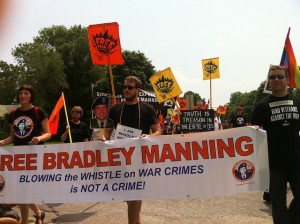Army blocks access to information about Bradley Manning Support Network, citing an “active investigation”


The Bradley Manning Support Network rallying for Bradley
A letter dated May 18, 2012, which purports to originate from the US Army Criminal Investigative Division (CID), rejects a Freedom of Information Act (FOIA) request submitted for data the government has collected on the Bradley Manning Support Network. The letter states that “an active investigation is in progress with an undetermined completion date.” At this time, the Bradley Manning Support Network has no reason to believe that the investigation in question refers to our Network (as compared to the investigation against Manning himself), but we object to any efforts by the government to block public access to documents pertaining to our organization.
Three calls were made to a number listed on the document in order to independently verify its authenticity. Each call was met with a persistent busy signal. The document was brought to our attention by a blogger operating under the pseudonym “Robert Paulson,” an apparent reference to the 1999 film Fight Club.
The letter cites a number of FOIA exemptions:
“This section does not apply to matters that are
[…]
(b)(6) personnel and medical files and similar files the disclosure of
which would constitute a clearly unwarranted invasion of personal privacy;
(b)(7) records or information compiled for law enforcement purposes, but
only to the extent that the production of such law enforcement records
or information
(A) could reasonably be expected to interfere with enforcement
proceedings;
[…]
(C) could reasonably be expected to constitute an unwarranted
invasion of personal privacy;
[…](F) could reasonably be expected to endanger the life or physical
safety of any individual[.]
A Department of Justice document adds that exemption (7)(F) is intended to protect government witnesses and “undercover agents.” Nowhere does the exemption require that authorities need to consider the organization under investigation to be a threat.
It’s important to understand that government agencies routinely over-cite exemptions, especially in their initial denials of FOIA requests. A review conducted by the Associated Press in 2010 found that the Obama administration had issued more FOIA exemptions in its first full year in office, compared to the Bush administration during its final year, despite an overall decrease in FOIA requests. This pattern of obfuscation has only gotten worse, according to a report issued last year by the open government watchdog group Citizens for Responsibility and Ethics in Washington, which found that the Obama administration was using FOIA exemptions 33% more often than during the Bush administration’s last year in office. This stands in stark contrast to the promises of unprecedented openness which were the hallmark of President Obama’s presidential campaign and the first days of the administration. Most of these highly touted open government initiatives have since suffered significant budget cuts.
Our government’s massive problem with over-classification was itself a hallmark of the WikiLeaks releases that have been attributed to Bradley Manning. Furthermore, as Vice President Biden has noted, there was no substantive damage to national security from the revelations. Government prosecutors have actually gone so far as to try to preclude any discussion of the documents’ impact from being heard during Bradley’s court-martial. According to the terms of President Obama’s own executive order, the fact that there is no evidence of harm to national security means that the WikiLeaks documents never should have been withheld from the public in the first place.
To put it simply, our government routinely cites any number of spurious exemptions to avoid producing information that belongs to the American people.
At this time, it is unclear whether the investigation cited in the FOIA denial simply refers to the government’s ongoing legal retaliation against Bradley Manning, or whether there is actually some other separate investigation targeting the Support Network.
We are nonetheless concerned that the Army may be investigating or overreacting to First Amendment-protected legal speech of Support Network members. For example, when hundreds of supporters were demonstrating in support of Bradley outside the front gates of Fort Meade during the December Article 32 hearings, over a hundred members of regional law enforcement were suited up in full riot gear just inside the base perimeter. They were on hand to back up a full mobilization of all available military police on base. And during a hearing in March, several Manning supporters were photographed while eating lunch outside a sandwich shop at Fort Meade.
Military officers have also taken retaliatory action against Bradley Manning activists. In December, they ordered noted gay rights activist Lt. Dan Choi to be tackled and removed from Bradley’s hearings, sending him to the hospital with an injured wrist. That same day, they moved to evict famed Pentagon Papers whistleblower Daniel Ellsberg from the courtroom, and relented only after attending journalists intervened on his behalf.
These actions by the government will have no effect on our commitment to supporting Bradley Manning, a whistleblower who brought light to egregious harms committed by the United States government.
We are continuing to investigate this matter. Please check back to BradleyManning.org for future updates. If you have additional information to provide regarding this FOIA request, please email [email protected]
/* */
.

